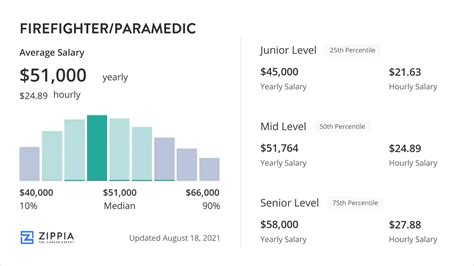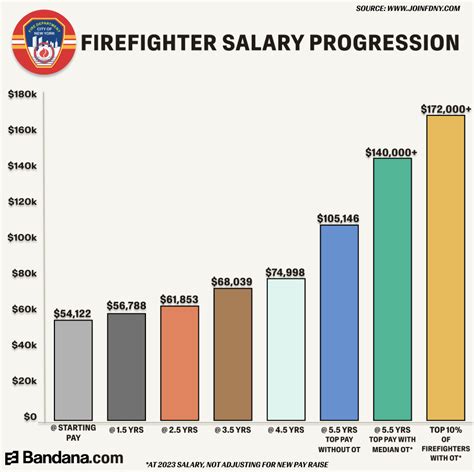For those drawn to a career of service, courage, and critical thinking, the role of a firefighter paramedic offers a unique and rewarding path. It combines the physically demanding work of fire suppression with the life-saving skills of advanced medical care. But beyond the profound sense of purpose, what is the financial reality of this profession?
The answer is promising. A career as a firefighter paramedic provides a stable and respectable income with significant room for growth. While national averages hover around $65,000 to $75,000 annually, many experienced professionals in high-paying regions can earn well over $100,000 per year with overtime. This article will break down the salary you can expect and the key factors that will shape your earning potential.
What Does a Firefighter Paramedic Do?

A firefighter paramedic is a cross-trained first responder who holds certifications in both firefighting and paramedicine. They are the front line of emergency response, handling a vast array of incidents. On any given shift, they might be called to:
- Provide Advanced Life Support (ALS): Respond to medical emergencies like heart attacks, strokes, and traumatic injuries. This includes administering medications, performing intubations, and using advanced medical equipment like cardiac monitors.
- Suppress Fires: Operate hoses, ladders, and other equipment to extinguish structural, vehicle, and wildland fires.
- Perform Rescues: Extricate victims from vehicle collisions, confined spaces, or high-angle environments.
- Respond to Hazardous Materials Incidents: Identify, contain, and decontaminate hazardous substance spills.
- Engage in Community Outreach: Conduct public education on fire safety and injury prevention.
This dual-skilled role makes them an incredibly valuable asset to any fire department and community.
Average Firefighter Paramedic Salary

Understanding the salary landscape starts with looking at the national averages from trusted sources. Because "Firefighter Paramedic" is a specialized, combined role, data can vary slightly depending on how it's categorized.
- Salary.com places the median annual salary for a Firefighter/Paramedic I in the United States at $65,789 as of May 2024. The typical salary range falls between $59,332 and $73,266.
- Glassdoor reports a higher estimated total pay of $77,163 per year, with a median base salary of $64,484. The difference often comes from additional compensation like overtime pay, which is common in this profession.
It's also helpful to look at the data for each component of the role. The [U.S. Bureau of Labor Statistics (BLS)](https://www.bls.gov/ooh/protective-service/firefighters.htm) reports the median annual wage for Firefighters was $57,690 in May 2023. For [EMTs and Paramedics](https://www.bls.gov/ooh/healthcare/emts-and-paramedics.htm), the median annual wage was $49,090.
The premium paid for the combined Firefighter Paramedic role is clear. The advanced medical skills of a paramedic significantly increase a firefighter's value and, consequently, their earning potential.
Key Factors That Influence Salary

While the national average provides a useful benchmark, your actual salary will be influenced by a combination of critical factors. Understanding these variables is key to maximizing your career earnings.
### Level of Education and Certification
In this field, certification is paramount. While a high school diploma is the minimum educational requirement, your level of medical certification is a direct driver of pay.
- EMT-Basic (EMT-B): This is the entry-level medical certification. A Firefighter/EMT will earn less than a paramedic.
- Paramedic (NRP): Achieving a paramedic certification requires a significantly more intensive program (often 1,200 to 1,800 hours of training vs. ~150 for an EMT). This advanced skillset commands a higher salary, often referred to as a "paramedic precept" or pay incentive, which can add thousands of dollars to an annual salary.
- Associate's or Bachelor's Degree: While not always required for entry-level positions, a degree in Fire Science, Emergency Management, or a related field can be crucial for promotions to officer ranks like Lieutenant, Captain, or Chief, which come with substantial pay increases.
### Years of Experience
Experience is highly valued and directly rewarded in the fire service. Departments typically have a structured step-increase system where pay automatically rises with years of service.
- Entry-Level (0-3 years): Probationary or new firefighters are at the bottom of the pay scale as they learn the ropes.
- Mid-Career (4-10 years): After several years, firefighters receive steady pay increases and may become eligible for promotion to roles like Driver/Engineer. According to [Payscale](https://www.payscale.com/research/US/Job=Fire_Fighter_/_Paramedic/Salary), an experienced firefighter paramedic earns an average of 19% more than an entry-level one.
- Senior/Late-Career (10+ years): Senior firefighters and officers (Lieutenants, Captains) are at the top of the pay scale. Their deep institutional knowledge and leadership skills are critical to the department's success.
### Geographic Location
Where you work is one of the single most significant factors affecting your salary. Pay varies dramatically between states and even between cities within the same state, often tied to the local cost of living and the tax base that funds the department.
According to the BLS, the top-paying states for firefighters are:
1. California: $91,960 (mean annual wage)
2. Washington: $87,480
3. New Jersey: $87,070
4. Oregon: $80,310
5. Hawaii: $78,740
It’s no surprise that major metropolitan areas with a high cost of living, like San Jose-Sunnyvale-Santa Clara, CA, and Los Angeles-Long Beach-Anaheim, CA, offer some of the highest salaries in the nation, often exceeding $115,000 per year.
### Employer Type
The type of department or agency you work for also plays a major role in your compensation.
- Municipal Fire Departments (City or County): This is the most common employer. Large, urban departments (e.g., FDNY, LAFD) typically offer higher salaries, more opportunities for specialization, and better benefits packages than smaller, rural, or suburban departments.
- Federal Government: Firefighter paramedics can work for federal agencies like the Department of Defense (on military bases), the National Park Service, or FEMA. These positions often follow the General Schedule (GS) pay scale and offer competitive federal benefits.
- Private/Industrial: Some large industrial facilities, airports, and private corporations maintain their own fire departments. These roles can be lucrative but are less common.
### Area of Specialization
Developing specialized skills not only makes you a more versatile first responder but also opens doors to pay incentives and promotions. Earning a spot on a specialty team can add a significant stipend to your base pay. Common specializations include:
- Hazardous Materials (HazMat) Technician
- Technical Rescue (e.g., swift water, high-angle rope rescue, confined space)
- Arson Investigator
- Aircraft Rescue and Firefighting (ARFF)
- SWAT Medic / Tactical Paramedic
Job Outlook

The career outlook for firefighter paramedics is stable and positive. The BLS projects that employment for Firefighters will grow by 3 percent from 2022 to 2032, which is about as fast as the average for all occupations.
The BLS anticipates about 29,900 openings for firefighters each year, on average, over the decade. Many of these openings are expected to result from the need to replace workers who retire or transfer to different occupations.
Crucially, candidates with a paramedic certification often have a significant advantage in the hiring process. As medical calls now constitute the majority of responses for most fire departments, the demand for dual-role professionals is higher than ever.
Conclusion

A career as a firefighter paramedic is far more than just a job—it's a calling that offers immense personal satisfaction and a secure, professional livelihood. While the path requires significant training, dedication, and resilience, the financial rewards are solid and reliable.
Your earning potential is not static; it's something you can actively build. By pursuing higher certifications, gaining experience, targeting high-paying geographic areas, and developing specialized skills, you can chart a course toward a financially and personally rewarding career on the front lines of public safety. For those ready to answer the call, the future is bright.
